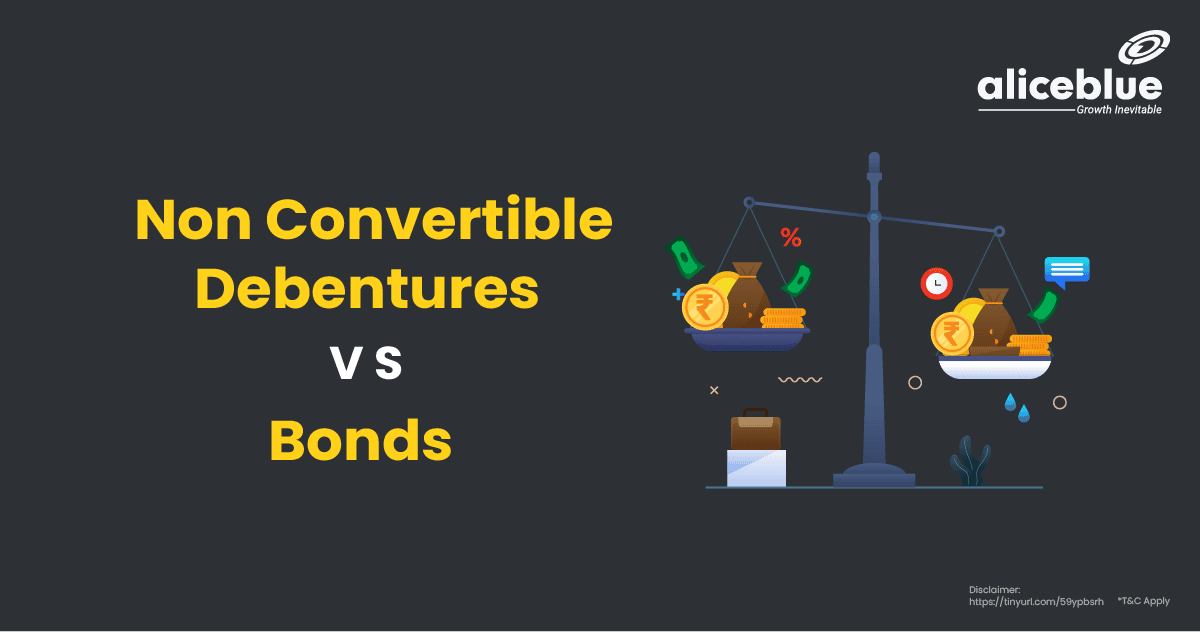The difference between Non-Convertible Debentures (NCDs) and bonds lies in conversion options. NCDs cannot be converted into shares, remaining purely as debt. Bonds may allow conversion into stock, offering potentially higher returns but with increased risk. Both serve as fixed-income investments.
Content:
- Non-Convertible Debentures Meaning
- What Are Bonds In India?
- Non Convertible Debentures Vs Bonds
- Difference Between Non-Convertible Debentures And Bonds – Quick Summary
- Non Convertible Debentures Vs Bonds – FAQs
Non-Convertible Debentures Meaning
Non-convertible debentures (NCDs) are fixed-income securities issued by companies to raise capital, which cannot be converted into equity or stock. They offer higher interest rates than convertible debentures and are backed by the issuing company’s assets, ensuring a fixed return to investors.
NCDs appeal to investors seeking stable income without the volatility of equity markets. Since they cannot be converted into shares, the principal amount is repaid at the end of the term. This makes NCDs a less risky investment compared to convertible options.
However, the safety of NCDs depends on the issuer’s creditworthiness. In the event of a company’s financial downturn, NCD investors have a higher claim on assets than shareholders but might still face risks. Therefore, evaluating the issuer’s financial stability is crucial before investing in NCDs.

What Are Bonds In India?
In India, bonds are debt securities issued by corporations, financial institutions, or the government to raise funds. Investors lending money earn interest at fixed intervals and are repaid the principal amount upon maturity. Bonds are considered a safer investment compared to stocks, offering steady income through interest.
Bonds in India come in various forms, including government securities (G-Secs), municipal bonds, and corporate bonds. Each type has different risk levels, interest rates, and tax implications. Government bonds are generally safer with lower yields, while corporate bonds might offer higher returns but carry greater risk.
Investors choose bonds based on their risk tolerance, investment horizon, and tax planning needs. For instance, tax-free bonds issued by government enterprises do not attract tax on interest earned, making them attractive to investors in higher tax brackets. Bonds can also serve as a diversification tool in an investment portfolio.
Non Convertible Debentures Vs Bonds
The main difference between Non-Convertible Debentures(NCDs) and Bonds is that NCDs cannot be converted into company shares and are typically secured. Bonds can be either convertible or non-convertible and may not always be secured, offering a variety of risk and income profiles to investors.
| Feature | Non-Convertible Debentures (NCDs) | Bonds |
| Conversion | Cannot be converted into company shares | Can be convertible or non-convertible |
| Security | Typically secured by assets of the issuing company | May or may not be secured |
| Purpose | Issued to raise capital without diluting equity | Issued to raise capital for various purposes, including operations and expansion |
| Risk Profile | Generally safer due to being asset-backed | Risk varies; convertible bonds might be riskier due to equity conversion option |
| Investor Preference | Preferred by investors seeking stable returns with lower risk | Preferred by a wide range of investors, depending on the bond’s features and the issuer’s credit rating |
| Interest Rates | Usually offer higher interest rates than convertible debentures | Interest rates can vary widely based on convertibility, security, and the issuer’s creditworthiness |
Difference Between Non-Convertible Debentures And Bonds – Quick Summary
- Non-convertible debentures (NCDs) are secure, fixed-income securities that offer high returns and are non-convertible into stock, making them less volatile and relatively safe investments.
- In India, bonds are issued by various entities to fund operations, offering fixed returns with varying risk levels and tax implications, suitable for diverse investment strategies.
- The main difference between non-convertible debentures and bonds is that Non-convertible debentures (NCDs) are secure, non-convertible into shares, offering stable returns whereas bonds vary in security and convertibility, presenting diverse risk and income opportunities.
- Open free demat account with Alice Blue in 15 minutes today! Invest in Stocks, Mutual Funds, Bonds & IPOs for Free. Also, trade at just ₹ 15/order and save 33.33% brokerage on every order.

Non Convertible Debentures Vs Bonds – FAQs
What is the Difference Between Non-Convertible Debentures And Bonds?
The main difference between non-convertible debentures and bonds is that bonds typically include government securities with a broader market scope, while debentures are corporate bonds secured by creditworthiness.
How Do Bonds Work?
Bonds are debt investments where an investor loans money to an entity that borrows the funds for a defined period at a fixed interest rate.
What Is The Difference Between Convertible And Non-convertible Bonds?
The main difference between convertible and non-convertible bonds is that convertible bonds can be converted into a predetermined number of the issuing company’s shares, but non-convertibles cannot.
What Happens To NCD On Maturity?
On maturity, Non-Convertible Debentures (NCDs) repay the principal amount to the holder, along with any final interest payments due.
Are Bonds Good Investment?
Bonds can be a good investment as they provide steady income through fixed interest payments and are generally lower risk than stocks.
Is It Good To Invest In Non-convertible Debentures?
Investing in Non-convertible Debentures can be good for those seeking higher fixed returns with relatively low risk, but depends on the issuer’s creditworthiness.
We hope that you are clear about the topic. But there is more to learn and explore when it comes to the stock market, commodity and hence we bring you the important topics and areas that you should know:






